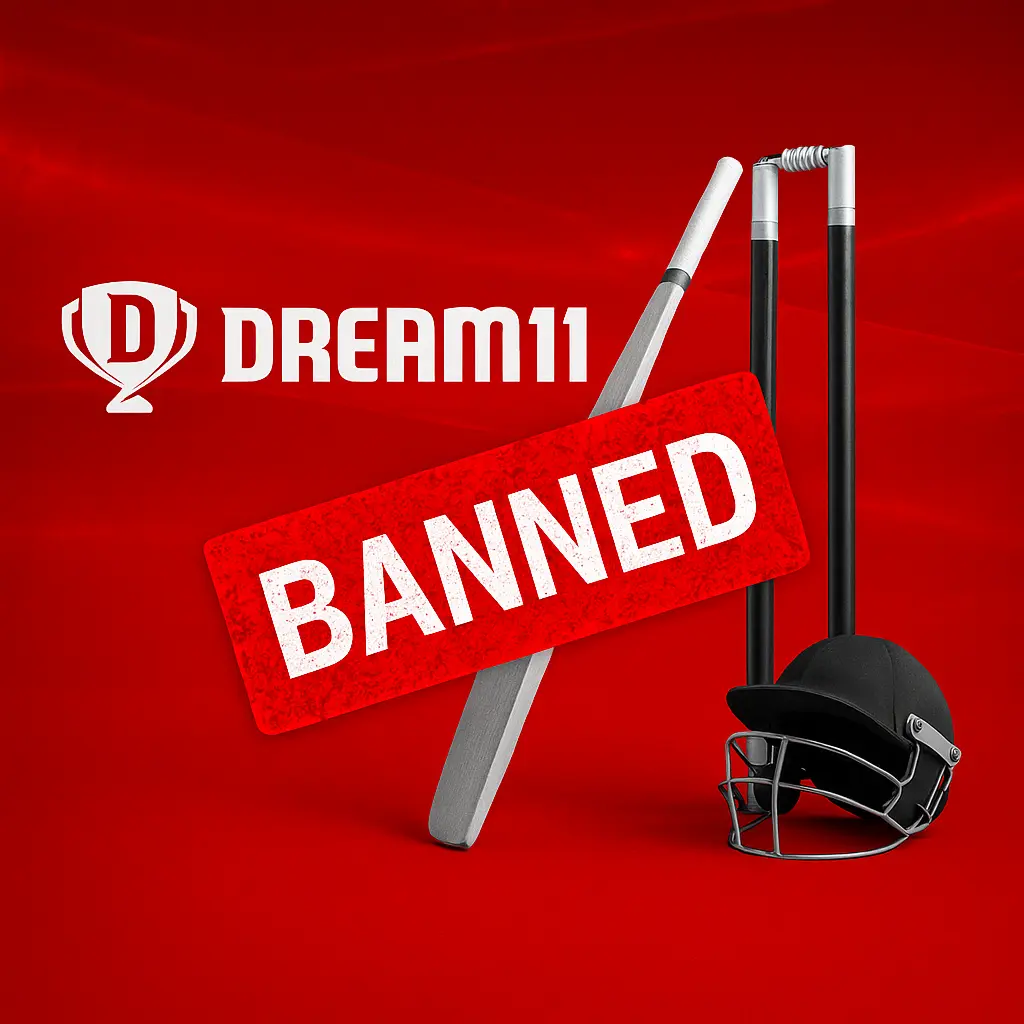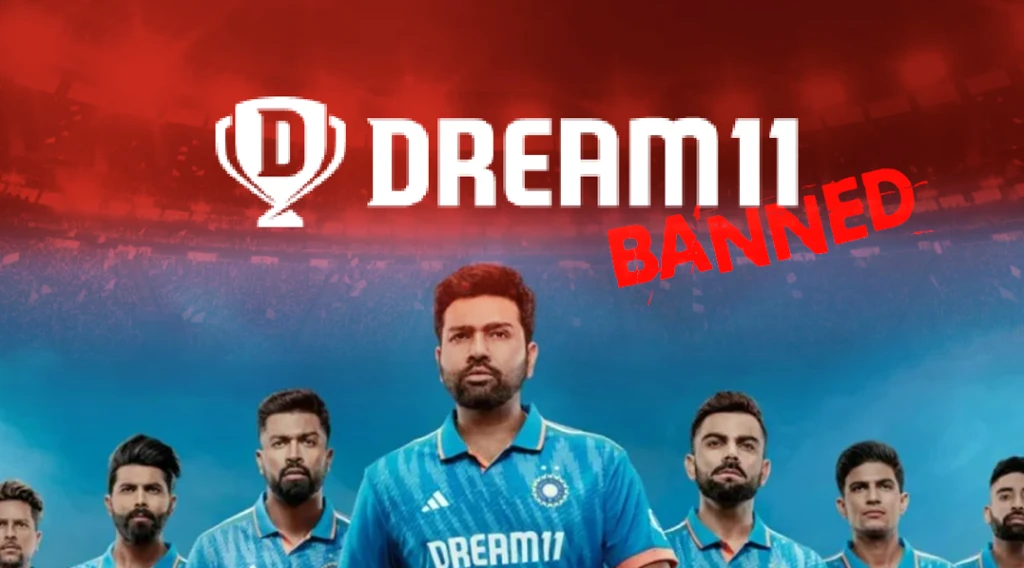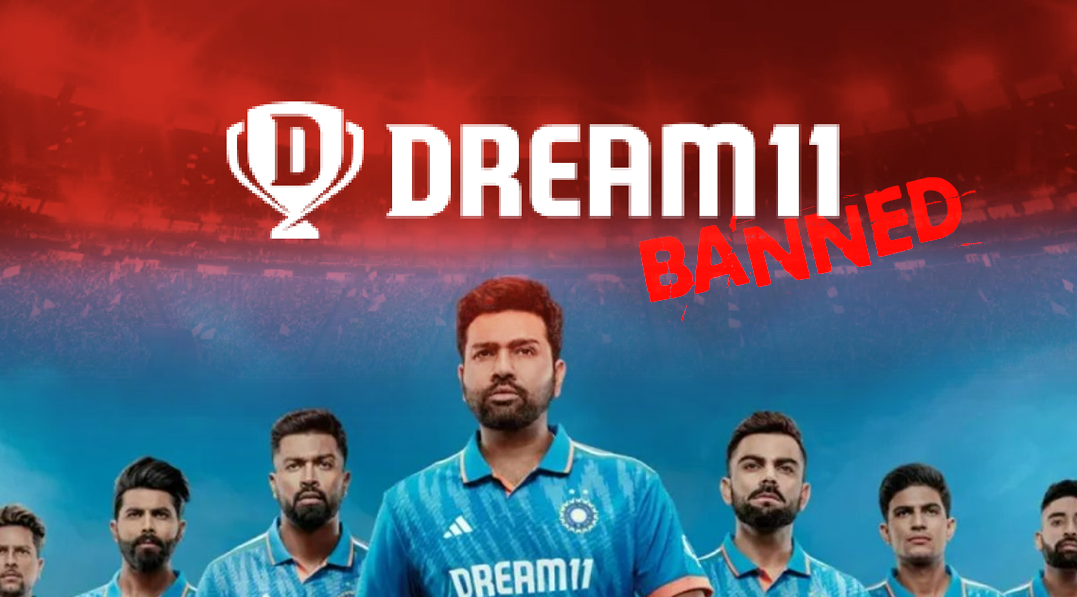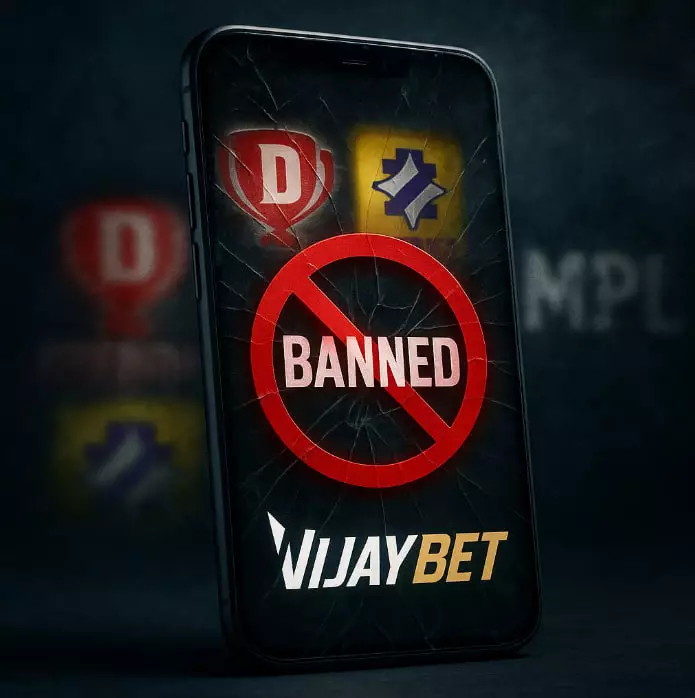Dream11 Ban Rocks Indian Cricket: $43M Sponsorship Gone — What’s Next?
In August 2025, India dropped a bombshell: a new law banning all real-money online games. Overnight, the country’s biggest fantasy sports app, Dream11, shut down its cash contests and walked away from a ₹35.8 billion ($43 million) sponsorship deal with the national team.
For millions of fans, this wasn’t just another policy change — it meant the end of weekend fantasy leagues, cash prizes, and one of the strongest connections between the sport and its digital audience. The Board of Control for Cricket in India (BCCI) suddenly lost a massive backer, and the industry was left scrambling for answers.
So what happens now? Will cricket find new sponsors? Will fantasy platforms reinvent themselves? And what does this ban say about the tug-of-war between fun, money, and regulation in India’s favorite sport?
India Bans Real-Money Gaming: What It Means for Dream11 & Cricket
India’s new law marks the most sweeping crackdown on real-money gaming the country has ever seen. For fantasy platforms like Dream11, it’s more than just a policy update — it’s a complete shutdown of their core business model. To understand the impact, we first need to look at what the law actually says and how far its reach extends.
Legal Provisions and Scope
On August 20, 2025, India’s parliament passed the Promotion and Regulation of Online Gaming Bill, which was signed into law just two days later. From that moment, the ban on real-money gaming in India became official. It covers everything from fantasy sports to poker, rummy, lotteries, and even online betting.
The law goes beyond just blocking the apps. All related transactions, ads, and promotions must stop immediately. Anyone caught running or promoting real-money games faces heavy fines or even up to three years in prison. To enforce this, payment providers, app stores, and digital platforms are now legally required to monitor activity and report violations.
Policy Objectives: Preventing Gambling Addiction and Promoting Healthy Gaming
The government stated that the policy aims to curb gambling addiction, protect young users’ finances, and encourage non-real-money games. Lawmakers highlighted that unregulated real-money games can be linked to financial fraud, tax evasion, and even threats to national security.
Experts note that the fantasy sports industry, led by platforms like Dream11, had grown rapidly in India. While this created economic opportunities, regulators feared unchecked monetization could result in social harm. The new law attempts to balance innovation with public safety.

Dream11 and Cricket Sponsorship
For more than a decade, Dream11 wasn’t just a fantasy app — it became a pillar of India’s sporting economy. By tying its brand directly to the nation’s favorite game, it shaped how fans engaged with matches and how money flowed into the sport.
Dream11’s Market Position
Operated by Dream Sports, Dream11 grew into India’s largest fantasy sports platform, built primarily around cricket. Fans could assemble virtual teams based on real player performances, making every over and wicket more thrilling. Competing platforms like MPL, PokerBaazi, and Zupee never matched its scale.
With over 120 million registered users, Dream11 played a major role in the fantasy sports and cricket market. Its sudden withdrawal leaves a vacuum for fans, advertisers, and broadcasters.
Deep Collaboration with Cricket
Dream11 has become synonymous with cricket in India. It served as the title sponsor of the Indian Premier League (IPL) and long-term sponsor of the Indian national cricket team, contributing $43 million in sponsorships. Thanks to a force majeure clause, Dream11 exited major BCCI contracts without penalties when the ban took effect.
This collaboration increased fan engagement during tournaments, with fantasy leagues driving higher viewership, social media interaction, and merchandise sales. The loss of sponsorship could affect multiple levels of the cricket ecosystem.
Immediate Impact
The ban forced Dream11 to halt all real-money games and end its BCCI sponsorships. For the cricket board, losing such a major financial backer was a heavy blow. Flagship tournaments like the Asia Cup suddenly face sponsorship gaps, while smaller domestic competitions could struggle to survive without similar support.
Industry Fallout: How Dream11’s Ban Impacts Cricket & Fantasy Players
The sudden exit of Dream11 didn’t just shake cricket sponsorships. It also sent ripples across the entire gaming ecosystem. From investors to startups, platforms to everyday fans, the aftershocks are still being felt.
Industry Impact
Dream Sports, the parent company behind Dream11, now faces a potential drop in valuation. Rivals are dealing with falling user numbers and nervous investors. Analysts warn that overall advertising revenue losses could cross ₹6,000 crore (≈$720 million), putting more than 200,000 jobs at risk.
Venture capital funding for Indian gaming startups may also dry up, while global gaming firms are rethinking their expansion plans into the country.
Platform Responses
Many platforms plan to shift toward free-to-play models, international expansion, and e-sports. Dream11 is exploring overseas cricket markets such as Australia and the UK to maintain user engagement. Other platforms may introduce subscription-based fantasy leagues or tie-ups with non-cricket sports.
Player Effects
While real-money games are suspended, players can withdraw existing wallet balances. Many cricket fans are turning to non-monetary fantasy games or watching matches, reducing paid platform engagement but keeping interest in cricket alive. This may encourage the growth of skill-based, educational gaming alternatives.
Future of Cricket Sponsorship
With Dream11 pulling out, the Board of Control for Cricket in India (BCCI) faces one of its biggest sponsorship gaps in years. Finding replacements won’t be easy, and the future of funding for tournaments now hangs in the balance.
Finding New Sponsors
The BCCI is actively searching for new partners, but landing one at Dream11’s scale remains uncertain. Some international brands have shown interest, yet regulatory risks and unstable ad markets make them cautious. In fact, jersey sponsorships in India carry what’s often called a “jersey curse” — sponsors frequently face financial trouble or withdraw before their deals end.
Financial and Exposure Risks
If the sponsorship gap continues, league prize pools, promotions, and broadcast revenues could shrink. That would weaken the sport’s financial muscle and even reduce India’s influence on the global stage.
Government Policy Outlook
Industry groups have petitioned for exceptions for skill-based games under regulated frameworks, but no official relaxation has been announced. Stakeholders continue to explore ways to balance economic growth, player engagement, and social responsibility.
Conclusion: Crisis or Transformation for Cricket?
Dream11 halting real-money gaming marks one of the biggest turning points in India’s online gaming and sports sponsorship ecosystem. In the short term, financial gaps and branding setbacks are unavoidable. But in the long run, platforms may diversify into new revenue models and encourage forms of engagement that move away from gambling.
For fans, losing the familiar fantasy experience is a setback, yet it also signals the beginning of a stricter regulatory era. Whether a new, fully compliant version of Dream11 will return is still uncertain, leaving the future of sponsorship in India’s favorite game wide open.
With adaptation, the country’s gaming industry could evolve into a safer and more sustainable ecosystem, while new sponsors step in to protect both fans and the financial health of the sport.











